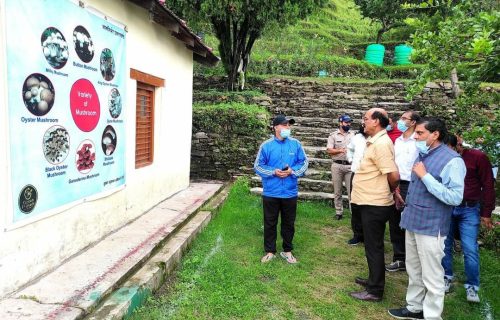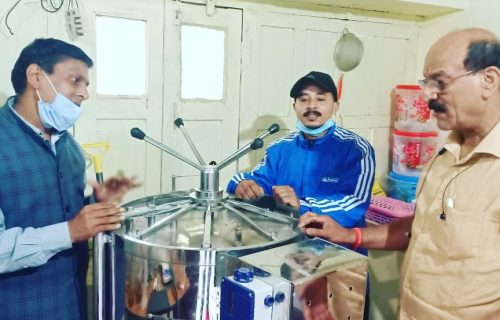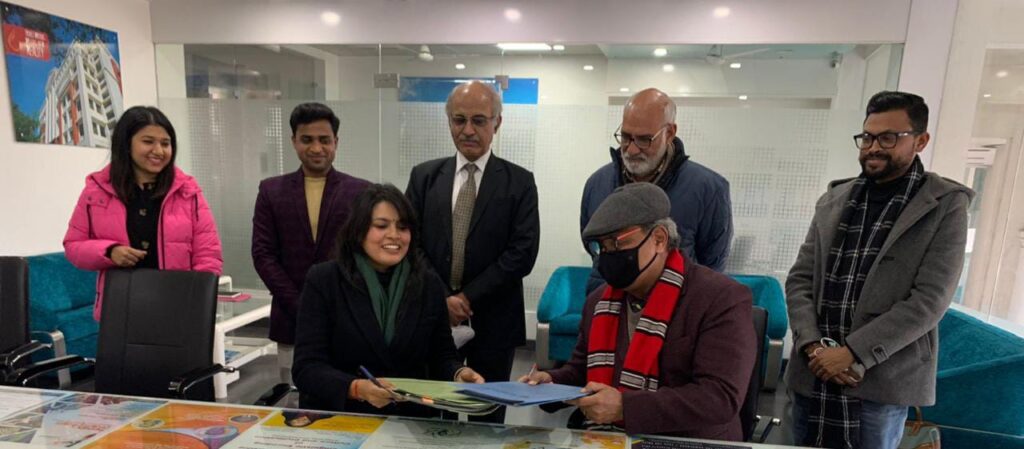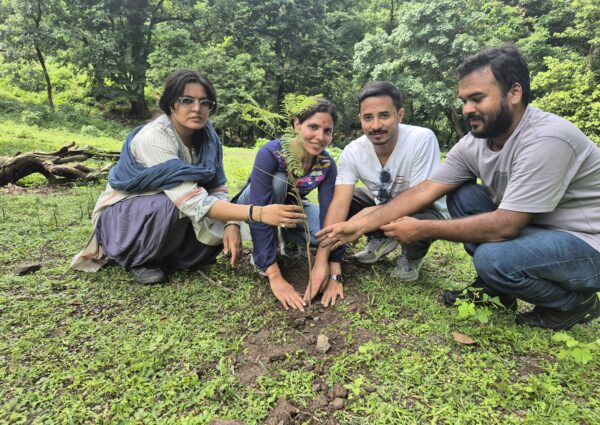- Home
- Our Projects
- 2020-21
2020-21
2020-21
In 2020-21, the Green Pahadi Foundation (GPF) undertook transformative projects to empower rural communities, particularly focusing on sustainable agriculture, women’s empowerment, and grassroots innovation in Uttarakhand. Through the Agricultural Technology Management Agency (ATMA) project, GPF implemented diverse training programs across six development blocks in Pauri Garhwal. By introducing sustainable livelihood practices such as mushroom cultivation, poultry farming, and beekeeping, the initiative provided rural women with essential skills and tools for income generation. Subsidized manure was distributed to reduce input costs, fostering self-reliance, curbing migration, and improving community participation in agriculture.
In partnership with the District Horticulture Department of Pauri Garhwal, GPF established the region’s first Mushroom Spawn and Tissue Culture Laboratory. This facility became a vital resource, producing 4,000 kg of spawns annually, enabling farmers to cultivate 21 tonnes of mushrooms worth ₹34 lakhs. The project played a pivotal role during the pandemic, providing a sustainable livelihood for rural farmers and women affected by unemployment and reverse migration. Farmers were further supported through a “Lab to Land” initiative, connecting them via WhatsApp groups for technical guidance and resources, strengthening the local agricultural ecosystem.
Additionally, GPF signed an MoU with Graphic Era Hill University (GEHU) to advance research, development, and training in mushroom cultivation, apiculture, and animal husbandry. The collaboration proposed the establishment of Excellence Learning and Action Research Centres, focusing on capacity building and skill enhancement for rural youth, women, and farmers. By integrating theoretical knowledge with practical training, GPF continued to support sustainable livelihoods and foster economic growth in rural communities.
Through these initiatives, GPF showcased its unwavering commitment to uplifting rural India, empowering women, and promoting innovative solutions for sustainable development.
Empowering Rural Communities under the ATMA Scheme
Fostering Sustainable Rural Development
In 2020-21, the Agricultural Technology Management Agency (ATMA) scheme brought new opportunities to rural communities in Pauri Garhwal, Uttarakhand, with Green Pahadi Foundation (GPF) as a key implementation partner. This initiative by the Government of India focuses on empowering farmers with technical expertise, sustainable practices, and resources to enhance agricultural productivity and rural livelihoods.
Project Scope and Objectives
The ATMA project aimed to transform rural lives by:
- Empowering women as leaders in agriculture and livelihood activities.
- Reducing farming costs through subsidized resources.
- Promoting sustainable practices to ensure environmental and economic resilience.
- Creating employment opportunities to curb migration and foster self-reliant communities.
This transformative project was implemented across the Khirsu, Pabau, Thalisain, Pauri, Kot, and Bironkhal development blocks in Pauri Garhwal.
Project Implementation
1. Skill Development and Women Empowerment
Recognizing the critical role of women in rural economies, GPF focused on enhancing their skills and involvement in agriculture. Key initiatives included:
- Poultry Farming: Providing technical training to maximize egg and meat production.
- Mushroom Cultivation: Teaching sustainable techniques to produce high-value products like dry mushrooms, mushroom badi, and pickles.
- Beekeeping: Introducing tools and practices for efficient honey production and biodiversity promotion.
- Fruit and Vegetable Farming: Encouraging organic and sustainable practices to improve yields and marketability.
Participants were also trained in value addition techniques to process raw produce into market-ready products, meeting the growing demand for organic and sustainable goods.
2. Subsidized Manure Supply
To alleviate the burden of high farming input costs, GPF collaborated with the Agriculture Department to provide farmers with manure at a 50% subsidy. This not only improved soil health but also reduced costs, enabling farmers to achieve better yields and greater economic viability.
Achievements and Impact
The ATMA project delivered tangible results that resonated locally and regionally:
- Women’s Empowerment: Women became active contributors to their household income through agricultural and value-added activities.
- Income Generation: Training programs enabled families to diversify income streams and achieve financial stability.
- Curbing Migration: By creating local employment opportunities, the project reduced the need for migration in search of work.
- Sustainable Practices: Adoption of eco-friendly techniques ensured environmental conservation and long-term benefits for farmers.
This project empowered communities, demonstrating how targeted interventions can drive social equity, economic growth, and environmental sustainability.
MoU with District Horticulture Department, Pauri Garhwal, Uttarakhand
Establishing the First Mushroom Spawn and Tissue Culture Laboratory
Mushrooms are not just a delectable culinary delight but also a significant contributor to rural livelihoods and employment generation, especially for women in agricultural communities. Often referred to as “vegetarian meat,” mushrooms have proven to be a sustainable farming option with high economic returns. During the challenging times of the COVID-19 pandemic, the mushroom industry emerged as a beacon of hope for rural farmers. While other sectors faced economic downturns, agriculture, including mushroom farming, continued to thrive, creating much-needed employment and ensuring food security.
Recognizing the potential of mushrooms as a tool for rural empowerment, the Green Pahadi Foundation (GPF) collaborated with the District Horticulture Department of Pauri Garhwal to establish the region’s first-ever Mushroom Spawn and Tissue Culture Laboratory in November 2020. This initiative not only addressed the demand for high-quality mushroom spawns but also created a sustainable livelihood model for farmers and rural women.
Project Scope and Objectives
The MoU with the District Horticulture Department aimed to:
- Establish a state-of-the-art Mushroom Spawn and Tissue Culture Laboratory in Pauri Garhwal.
- Promote mushroom cultivation as a profitable and sustainable livelihood option.
- Provide subsidized, high-quality mushroom spawns to farmers to reduce production costs.
- Equip rural farmers and women with the technical know-how to excel in mushroom farming.
- Build a strong farmer-support network under the slogan “Lab to Land”, ensuring continuous guidance and resources.
Project Implementation
1.Laboratory Establishment:
The laboratory, set up in November 2020, specializes in producing high-quality mushroom spawns (seeds of mushrooms). These spawns are distributed to farmers at subsidized rates, enabling cost-effective mushroom farming.
2.Skill Development and Farmer Support
- GPF actively trained farmers and rural women in mushroom farming techniques, including spawn preparation, cultivation, harvesting, and value addition.
- A dedicated WhatsApp group was created to connect over 150 farmers, providing real-time technical inputs, troubleshooting, and updates on best practices in mushroom farming.
3. Promoting Innovation in Mushroom Cultivation
- The laboratory introduced innovative techniques in mushroom farming and tissue culture, empowering farmers with modern agricultural practices.


Achievements and Impact
Production Success
- The laboratory produced 4,000 kgs of high-quality mushroom spawns, which supported the cultivation of approximately 21 tonnes of mushrooms worth ₹34 lakhs in market value.
- These spawns were distributed on a subsidized basis, reducing farmers’ input costs and boosting profitability.
Economic Empowerment
- The initiative significantly contributed to rural women’s empowerment by offering them sustainable employment opportunities in mushroom cultivation.
- Farmers who engaged in this project experienced improved financial security, fostering resilience against economic uncertainties.
Community Engagement and Connectivity
- The “Lab to Land” initiative connected farmers through a digital platform, fostering a supportive and collaborative farming community.
- Over 150 farmers gained access to technical guidance, resources, and real-time problem-solving via a dedicated WhatsApp group.
Government Recognition
- The initiative earned praise from Honourable Agriculture Minister Shri Subodh Uniyal Ji, who visited the laboratory to acknowledge GPF’s pioneering efforts. The project was celebrated as a benchmark for agricultural innovation and rural development.
MoU with Graphic Era Hill University (GEHU), Dehradun, Uttarakhand
At Green Pahadi Foundation (GPF), our unwavering commitment to grassroots development is driven by three core principles: Research, Development, and Training. These fundamentals serve as the foundation for our efforts to empower rural communities, foster sustainable income generation, and create replicable models for development. In alignment with our mission, we collaborated with Graphic Era Hill University (GEHU), Dehradun through a Memorandum of Understanding (MoU) in 2020 to advance these goals further.
Scope and Objectives of the MoU
The MoU between GPF and GEHU was established to:
- Create an Action Research Centre and an Excellence Learning Centre dedicated to Mushroom Cultivation.
- Promote sustainable livelihoods through skill enhancement in areas like Mushroom Cultivation, Apiculture, and Animal Husbandry.
- Enhance the socio-economic development of rural farmers, youth, and women in Uttarakhand.
- Facilitate capacity building and skill development for both GEHU students and rural farmers.
- Undertake Corporate Social Responsibility (CSR) initiatives that directly benefit rural communities.

Key Focus Areas
Mushroom Cultivation as a Model for Livelihood
- Establishing a state-of-the-art facility for action research and skill training in mushroom cultivation.
- Exploring innovative farming techniques and value addition for mushrooms to maximize economic benefits for rural farmers.
Apiculture and Animal Husbandry
- Promoting apiculture as a sustainable farming practice, with training on bee-keeping, honey production, and value-added honey products.
- Developing skills in animal husbandry to improve livestock productivity and provide additional income sources for rural households.
Skill Development for Youth and Farmers
- Conducting capacity-building workshops for GEHU students and farmers, enabling them to gain hands-on experience in sustainable agricultural practices.
- Introducing modern techniques and technologies that bridge the gap between theoretical knowledge and practical applications.
Future Outlook
The partnership between GPF and Graphic Era Hill University is more than an agreement; it is a step towards building a sustainable future for rural India. By combining academic resources with grassroots expertise, we aim to make a lasting impact in rural communities, empowering them to lead independent and dignified lives.


